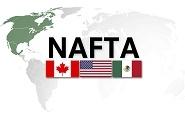Government/Policy

November 28, 2017
Automakers Tell Pence to Drop NAFTA Rules of Origin Proposal
Written by Sandy Williams
Detroit automakers met with Vice President Mike Pence and U.S. Trade Representative Robert Lighthizer on Monday to express concerns about the U.S. proposal on NAFTA automotive rules of origin.
General Motors Co. CEO Mary Barra, Fiat Chrysler Automobiles CEO Sergio Marchionne and Ford Motor Co. Executive Vice President and President of Global Operations Joe Hinrichs told Pence, Lighthizer and National Economic Council Director Gary Cohn that increasing the minimum percentage of parts for autos manufactured in North America could add thousands of dollars to the price of vehicles for consumers.
The U.S. has proposed that the minimum percentage of NAFTA parts in North American-manufactured vehicles be increased from 62.5 percent to 85 percent. In addition, U.S. negotiators want 50 percent of automotive content to come from the United States.
Matt Blunt, President of the American Automotive Policy Council (AAPC), which lobbies for Ford, GM and Fiat Chrysler, said the face-to-face meeting was appreciated by the automakers. The automakers urged Pence to tell the president to focus on preventing currency manipulation rather than changing rules of origin.
“We believe achieving inclusion of strong and enforceable currency discipline and ensuring foreign markets accept products built to our standards are important components of a modern NAFTA agreement,” said Blunt in a statement following the meeting.
A spokesperson for Pence said, “The Vice President emphasized President Trump’s commitment to enact historic tax cuts that will enable companies to create jobs, raise wages and spur American innovation. The Vice President also discussed the President’s firm commitment to grow manufacturing in the United States, reduce trade deficits, and strengthen the U.S. auto industry.”
The fifth round of NAFTA negotiations concluded last week without much progress. Round six is scheduled for Jan. 23-28 in Montreal.







